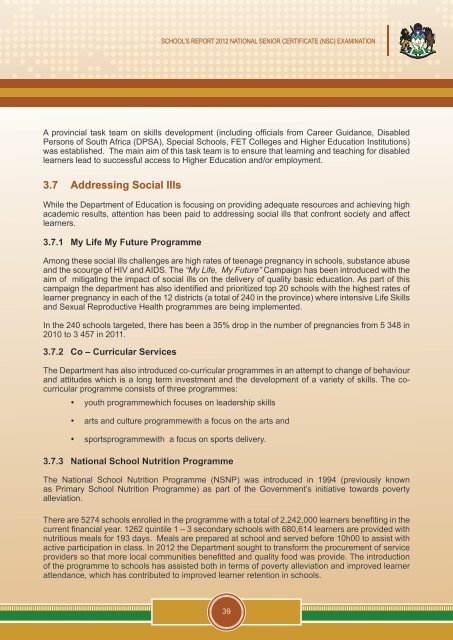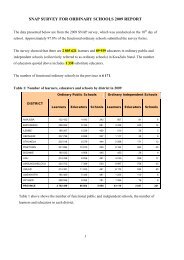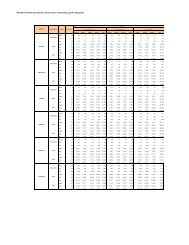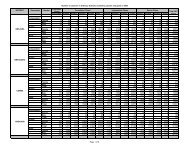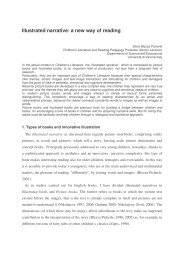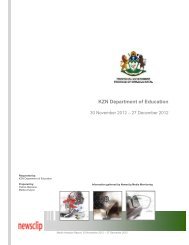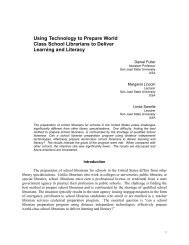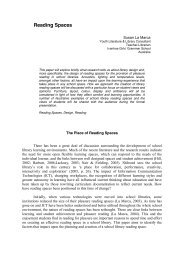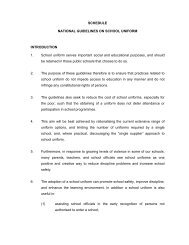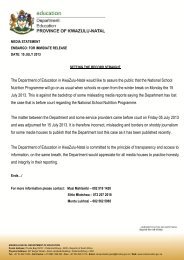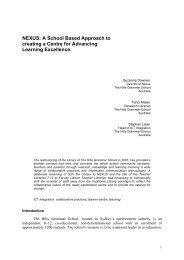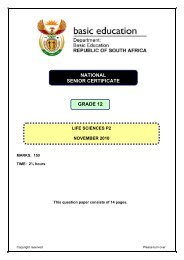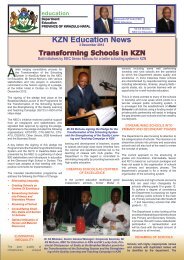School's Report 2012 National Senior Certificate (NSC) Examination
School's Report 2012 National Senior Certificate (NSC) Examination
School's Report 2012 National Senior Certificate (NSC) Examination
You also want an ePaper? Increase the reach of your titles
YUMPU automatically turns print PDFs into web optimized ePapers that Google loves.
SCHOOL’S REPORT <strong>2012</strong> NATIONAL SENIOR CERTIFICATE (<strong>NSC</strong>) EXAMINATION<br />
A provincial task team on skills development (including officials from Career Guidance, Disabled<br />
Persons of South Africa (DPSA), Special Schools, FET Colleges and Higher Education Institutions)<br />
was established. The main aim of this task team is to ensure that learning and teaching for disabled<br />
learners lead to successful access to Higher Education and/or employment.<br />
3.7 Addressing Social Ills<br />
While the Department of Education is focusing on providing adequate resources and achieving high<br />
academic results, attention has been paid to addressing social ills that confront society and affect<br />
learners.<br />
3.7.1 My Life My Future Programme<br />
Among these social ills challenges are high rates of teenage pregnancy in schools, substance abuse<br />
and the scourge of HIV and AIDS. The “My Life, My Future” Campaign has been introduced with the<br />
aim of mitigating the impact of social ills on the delivery of quality basic education. As part of this<br />
campaign the department has also identified and prioritized top 20 schools with the highest rates of<br />
learner pregnancy in each of the 12 districts (a total of 240 in the province) where intensive Life Skills<br />
and Sexual Reproductive Health programmes are being implemented.<br />
In the 240 schools targeted, there has been a 35% drop in the number of pregnancies from 5 348 in<br />
2010 to 3 457 in 2011.<br />
3.7.2 Co – Curricular Services<br />
The Department has also introduced co-curricular programmes in an attempt to change of behaviour<br />
and attitudes which is a long term investment and the development of a variety of skills. The cocurricular<br />
programme consists of three programmes:<br />
• youth programmewhich focuses on leadership skills<br />
• arts and culture programmewith a focus on the arts and<br />
• sportsprogrammewith a focus on sports delivery.<br />
3.7.3 <strong>National</strong> School Nutrition Programme<br />
The <strong>National</strong> School Nutrition Programme (NSNP) was introduced in 1994 (previously known<br />
as Primary School Nutrition Programme) as part of the Government’s initiative towards poverty<br />
alleviation.<br />
There are 5274 schools enrolled in the programme with a total of 2,242,000 learners benefiting in the<br />
current financial year. 1262 quintile 1 – 3 secondary schools with 680,614 learners are provided with<br />
nutritious meals for 193 days. Meals are prepared at school and served before 10h00 to assist with<br />
active participation in class. In <strong>2012</strong> the Department sought to transform the procurement of service<br />
providers so that more local communities benefitted and quality food was provide. The introduction<br />
of the programme to schools has assisted both in terms of poverty alleviation and improved learner<br />
attendance, which has contributed to improved learner retention in schools.<br />
39


